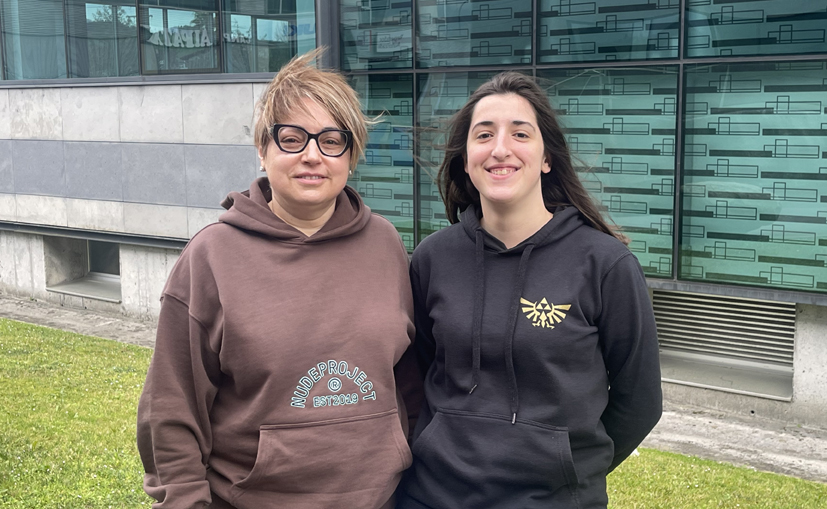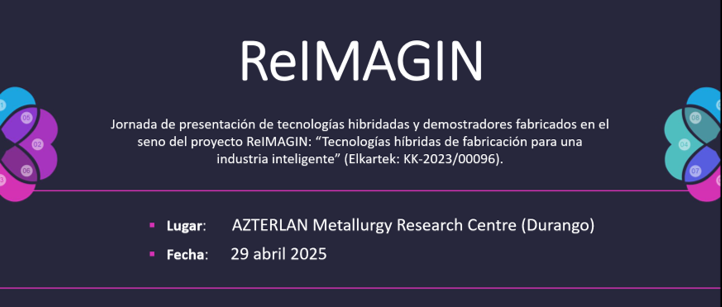
Dori (left) & Olaia (right)
Dori Dueñas (left), testing samples preparation technician, and Olaia Miguelez (right), researcher in Intelligent Manufacturing Technologies, share their perception of the presence of women in the technological and industrial fields.
Can you briefly explain your background and field of work at AZTERLAN?
Dori: I work in the area of sample preparation for metallographic analysis. Previously, I worked in several industrial companies dedicated to the manufacturing of metallic parts: stamping, forging, machining, welding, verification… where I held different positions. I joined AZTERLAN about a year ago.
Olaia: I am dedicated to the development of digital twins and control tools for metal manufacturing processes. An main part of my work consists of managing data sources so that these can be exploited intelligently and converted into valuable information for companies. The ultimate goal of our work is to improve process control, to be able to make predictions and develop systems that propose corrective actions when parameters are out of control or the result of a production is expected to be defective.
What is your perception of the presence and participation of women in the field of technology and industry?
Dori: My experience in the different industrial companies where I worked is that the presence of women in technical positions is noticeably lower. I have to say that, personally, I do not consider that it has been a limiting factor for me, neither when it comes to getting those positions nor in my relationships with the rest of my colleagues. On the contrary, I have always felt respected and integrated into the different teams in which I have participated.
Olaia: In my case, as a computer engineer belonging to the metalworking industry, since my university stage I have seen that women were a minority around me. For me either it has not been a limitation and I do not believe that my colleagues make a difference between girls/women and boys/mes. In that sense, I believe that my generation does not feel that there are differences between the professional fields that each gender can access to… although in practice, when it comes to choosing our professional paths, there does seem to be a separation.
What do you think is the reason for this?
Olaia: I think that, partially, it has to do with how each person foresees themselves in a job of that type in the future. It can happen that, although we know that we can get into that field, the references that we see there are different from how we perceive ourselves, and therefore we do not imagine or project ourselves there.
It may also be that in those moments when we have to be choosing our future careers, we might not have enough information or close experiences about the choices that we are given.
Dori: It is true. I think that references are very important. The more references we have, from close family member experiences others around us, and the more we see a reality that may resemble our own, the easier it is to feel that we could also be there.
What do you think are the keys to transforming the current scenario?
Dori: I think that a lot of progress has been made and that the presence of women in different fields keeps increasing. This leads to us seeing more women in different domains and, therefore, that makes it easier for new generations to see themselves reflected.
Olaia: I think the educational system also has a lot to do with this change. In my case, I feel that coming from an area where the Mondragon Corporation is very strong, I have always been exposed to industrial professions. Many educational centres around my area have a significant vocational training portfolio, which, at the same time, is linked to a technical university… and in both cases there is a great alignment with a strong industrial environment. I think that these types of ecosystems are favourable to this objective.
I also think that, from an educational point of view, at an earlier age it is important for children to have contact with the worlds of science and technology (beyond physics, chemistry and mathematics), in the form of workshops or more tangible activities, which will allow them to experiment.
Dori: I also think that we need to continue working on social awareness and make an appropriate use of the different tools that have been created to support the independence and entrance of women into different domains, both professionally and socially… I think that, when it comes to society, in many ways, we are experiencing a “turn backwards”, idealizing certain feminine roles, permitting violent or controlling attitudes within young couples… I feel that ther is also a raise in terms of points of view that seem to aim at setting men and women against each other, instead of promoting the concept of equality, which is what we seek for. To me, these are worrying issues we need to continue working on.
Olaia: I agree. I think that the younger generations do not feel as involved with the fight of previous generations that has brought us to the current scenario and, no matter what we are told from previous experiences, we take our rights for granted. But not we are realizing that more radical positions are growing… and I think that is dangerous.
For example, as a fan of videogames, I perceive a lot of misogyny and violence against women among gamers. And I am not referring to the narrative of the videogames, but to the behavior of male gamers who reject and insult female players, just because they are women… I think this kind of behavior is closely linked to the anonymity of the internet and the “zero censorship” policy that is currently being practiced. This allows hate messages to be launched without any consequences. In my view, all of this contributes to the polarization of positions and endangers the system as we know it.


